Contract Law Assignment: Analyzing the Tom and Andy Motorcycle Case
VerifiedAdded on 2023/01/05
|7
|2015
|61
Case Study
AI Summary
This case study examines the legal aspects of a potential contract between Tom and Andy regarding the sale of a Harley Davidson motorcycle. Andy initially advertises the motorcycle, leading to a series of communications that are analyzed under contract law principles. The analysis focuses on whether a legally enforceable contract was formed, considering the concepts of offer, counteroffer, and acceptance. The case explores how Andy's flyer constitutes an invitation to offer, Tom's initial inquiries and subsequent offers and counteroffers, and Andy's responses. The student analyzes each communication to determine if a valid agreement was reached, considering the absence of clear acceptance and the presence of counteroffers that extinguished previous offers. Ultimately, the analysis concludes that no contract was formed, and Andy is not legally bound to the sale, and Tom is entitled to the return of the deposit.
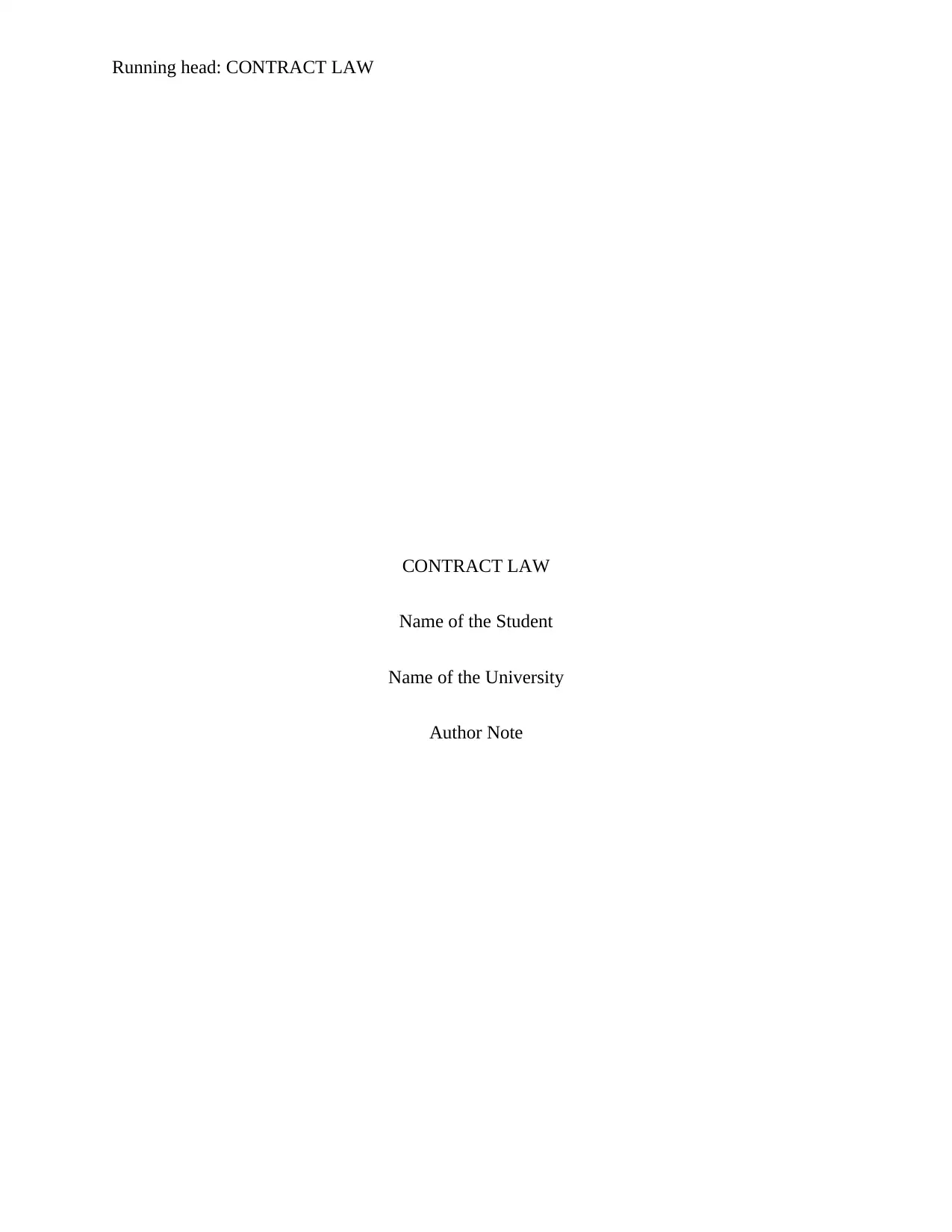
Running head: CONTRACT LAW
CONTRACT LAW
Name of the Student
Name of the University
Author Note
CONTRACT LAW
Name of the Student
Name of the University
Author Note
Paraphrase This Document
Need a fresh take? Get an instant paraphrase of this document with our AI Paraphraser
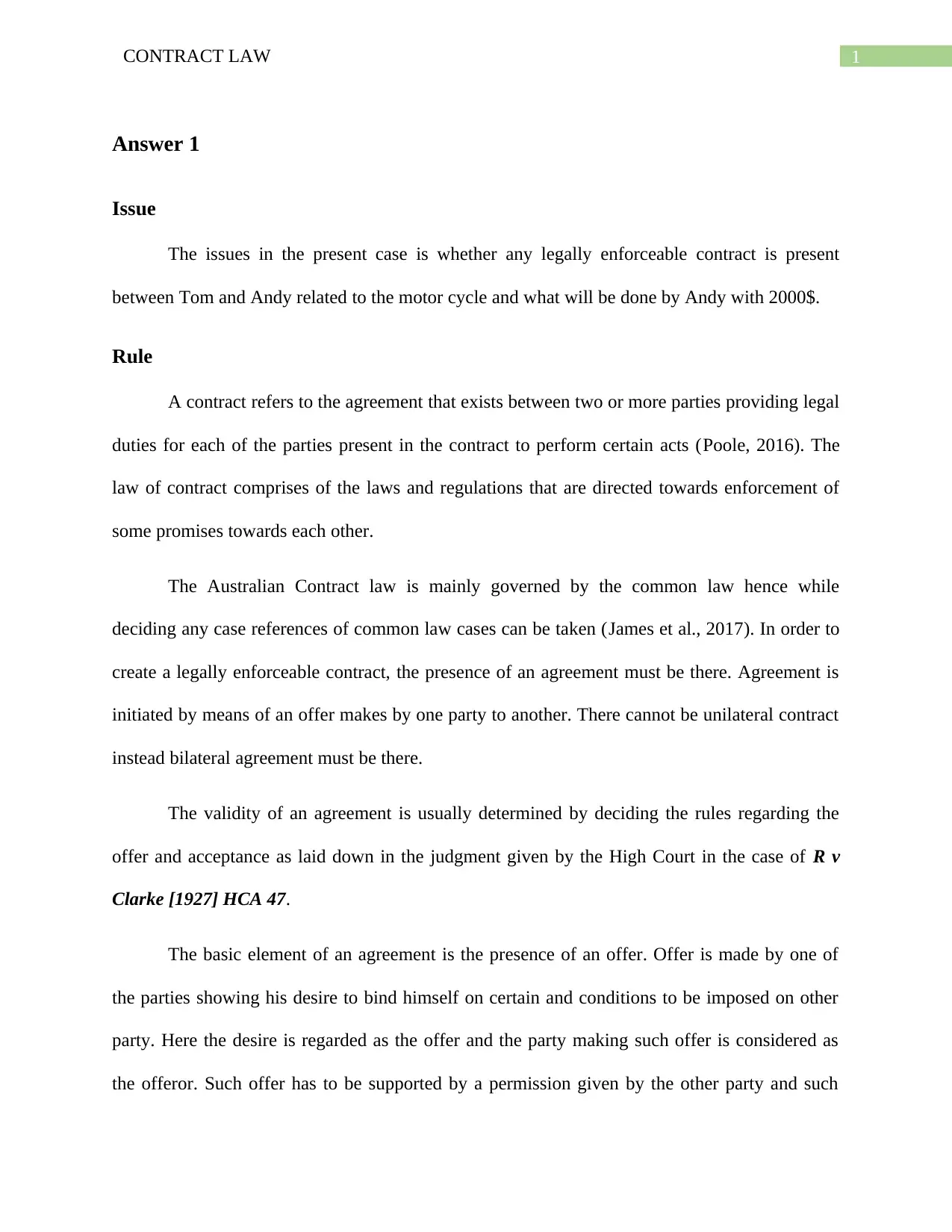
1CONTRACT LAW
Answer 1
Issue
The issues in the present case is whether any legally enforceable contract is present
between Tom and Andy related to the motor cycle and what will be done by Andy with 2000$.
Rule
A contract refers to the agreement that exists between two or more parties providing legal
duties for each of the parties present in the contract to perform certain acts (Poole, 2016). The
law of contract comprises of the laws and regulations that are directed towards enforcement of
some promises towards each other.
The Australian Contract law is mainly governed by the common law hence while
deciding any case references of common law cases can be taken (James et al., 2017). In order to
create a legally enforceable contract, the presence of an agreement must be there. Agreement is
initiated by means of an offer makes by one party to another. There cannot be unilateral contract
instead bilateral agreement must be there.
The validity of an agreement is usually determined by deciding the rules regarding the
offer and acceptance as laid down in the judgment given by the High Court in the case of R v
Clarke [1927] HCA 47.
The basic element of an agreement is the presence of an offer. Offer is made by one of
the parties showing his desire to bind himself on certain and conditions to be imposed on other
party. Here the desire is regarded as the offer and the party making such offer is considered as
the offeror. Such offer has to be supported by a permission given by the other party and such
Answer 1
Issue
The issues in the present case is whether any legally enforceable contract is present
between Tom and Andy related to the motor cycle and what will be done by Andy with 2000$.
Rule
A contract refers to the agreement that exists between two or more parties providing legal
duties for each of the parties present in the contract to perform certain acts (Poole, 2016). The
law of contract comprises of the laws and regulations that are directed towards enforcement of
some promises towards each other.
The Australian Contract law is mainly governed by the common law hence while
deciding any case references of common law cases can be taken (James et al., 2017). In order to
create a legally enforceable contract, the presence of an agreement must be there. Agreement is
initiated by means of an offer makes by one party to another. There cannot be unilateral contract
instead bilateral agreement must be there.
The validity of an agreement is usually determined by deciding the rules regarding the
offer and acceptance as laid down in the judgment given by the High Court in the case of R v
Clarke [1927] HCA 47.
The basic element of an agreement is the presence of an offer. Offer is made by one of
the parties showing his desire to bind himself on certain and conditions to be imposed on other
party. Here the desire is regarded as the offer and the party making such offer is considered as
the offeror. Such offer has to be supported by a permission given by the other party and such
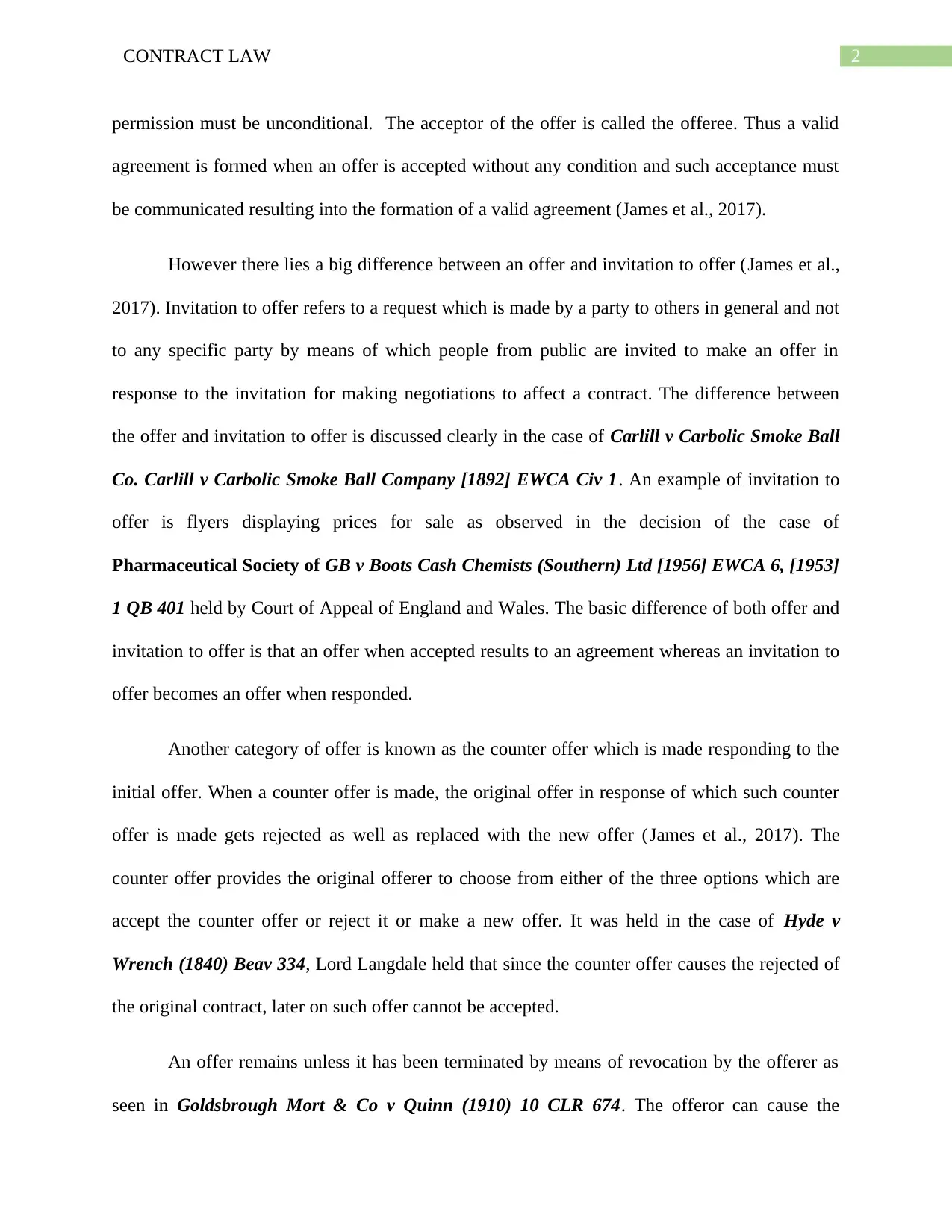
2CONTRACT LAW
permission must be unconditional. The acceptor of the offer is called the offeree. Thus a valid
agreement is formed when an offer is accepted without any condition and such acceptance must
be communicated resulting into the formation of a valid agreement (James et al., 2017).
However there lies a big difference between an offer and invitation to offer (James et al.,
2017). Invitation to offer refers to a request which is made by a party to others in general and not
to any specific party by means of which people from public are invited to make an offer in
response to the invitation for making negotiations to affect a contract. The difference between
the offer and invitation to offer is discussed clearly in the case of Carlill v Carbolic Smoke Ball
Co. Carlill v Carbolic Smoke Ball Company [1892] EWCA Civ 1. An example of invitation to
offer is flyers displaying prices for sale as observed in the decision of the case of
Pharmaceutical Society of GB v Boots Cash Chemists (Southern) Ltd [1956] EWCA 6, [1953]
1 QB 401 held by Court of Appeal of England and Wales. The basic difference of both offer and
invitation to offer is that an offer when accepted results to an agreement whereas an invitation to
offer becomes an offer when responded.
Another category of offer is known as the counter offer which is made responding to the
initial offer. When a counter offer is made, the original offer in response of which such counter
offer is made gets rejected as well as replaced with the new offer (James et al., 2017). The
counter offer provides the original offerer to choose from either of the three options which are
accept the counter offer or reject it or make a new offer. It was held in the case of Hyde v
Wrench (1840) Beav 334, Lord Langdale held that since the counter offer causes the rejected of
the original contract, later on such offer cannot be accepted.
An offer remains unless it has been terminated by means of revocation by the offerer as
seen in Goldsbrough Mort & Co v Quinn (1910) 10 CLR 674. The offeror can cause the
permission must be unconditional. The acceptor of the offer is called the offeree. Thus a valid
agreement is formed when an offer is accepted without any condition and such acceptance must
be communicated resulting into the formation of a valid agreement (James et al., 2017).
However there lies a big difference between an offer and invitation to offer (James et al.,
2017). Invitation to offer refers to a request which is made by a party to others in general and not
to any specific party by means of which people from public are invited to make an offer in
response to the invitation for making negotiations to affect a contract. The difference between
the offer and invitation to offer is discussed clearly in the case of Carlill v Carbolic Smoke Ball
Co. Carlill v Carbolic Smoke Ball Company [1892] EWCA Civ 1. An example of invitation to
offer is flyers displaying prices for sale as observed in the decision of the case of
Pharmaceutical Society of GB v Boots Cash Chemists (Southern) Ltd [1956] EWCA 6, [1953]
1 QB 401 held by Court of Appeal of England and Wales. The basic difference of both offer and
invitation to offer is that an offer when accepted results to an agreement whereas an invitation to
offer becomes an offer when responded.
Another category of offer is known as the counter offer which is made responding to the
initial offer. When a counter offer is made, the original offer in response of which such counter
offer is made gets rejected as well as replaced with the new offer (James et al., 2017). The
counter offer provides the original offerer to choose from either of the three options which are
accept the counter offer or reject it or make a new offer. It was held in the case of Hyde v
Wrench (1840) Beav 334, Lord Langdale held that since the counter offer causes the rejected of
the original contract, later on such offer cannot be accepted.
An offer remains unless it has been terminated by means of revocation by the offerer as
seen in Goldsbrough Mort & Co v Quinn (1910) 10 CLR 674. The offeror can cause the
⊘ This is a preview!⊘
Do you want full access?
Subscribe today to unlock all pages.

Trusted by 1+ million students worldwide
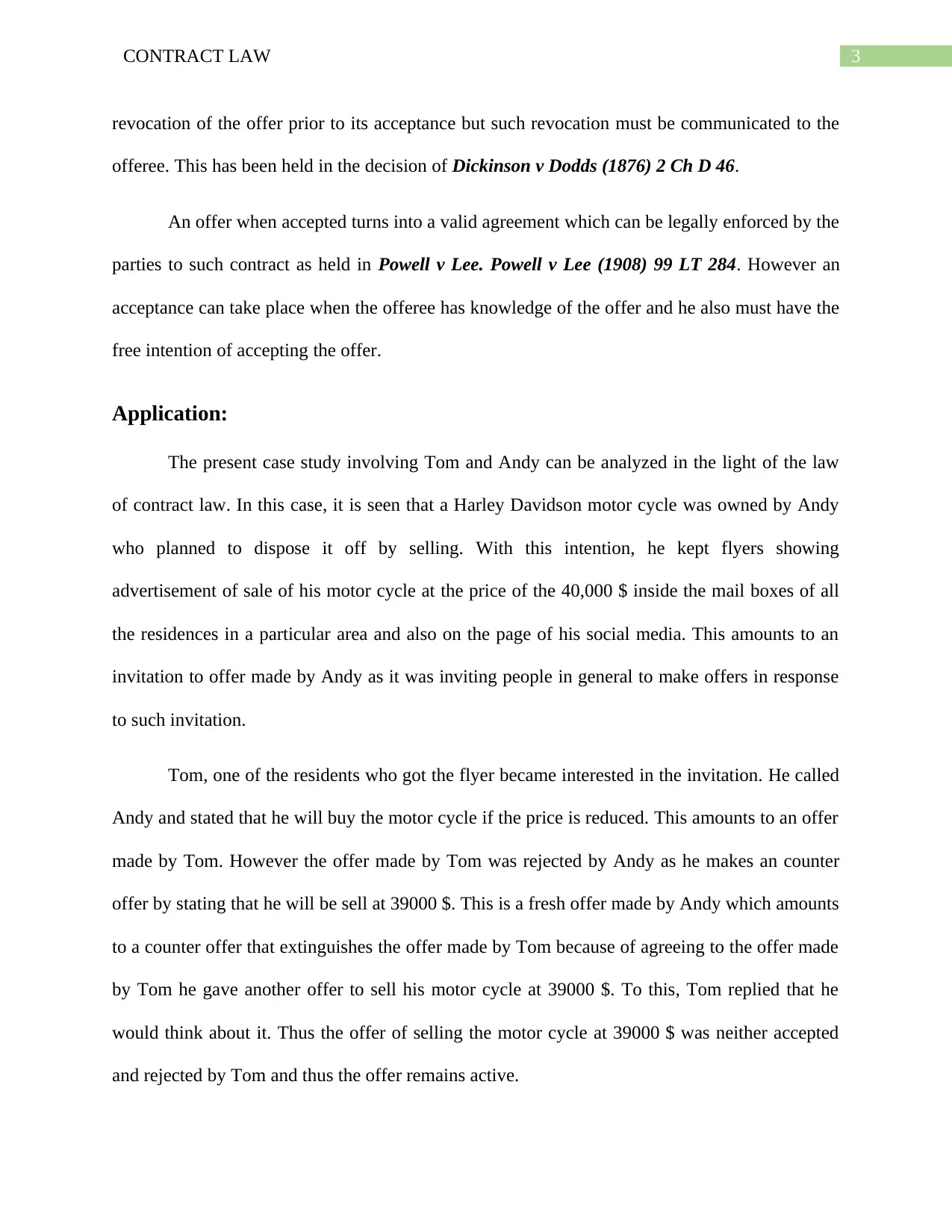
3CONTRACT LAW
revocation of the offer prior to its acceptance but such revocation must be communicated to the
offeree. This has been held in the decision of Dickinson v Dodds (1876) 2 Ch D 46.
An offer when accepted turns into a valid agreement which can be legally enforced by the
parties to such contract as held in Powell v Lee. Powell v Lee (1908) 99 LT 284. However an
acceptance can take place when the offeree has knowledge of the offer and he also must have the
free intention of accepting the offer.
Application:
The present case study involving Tom and Andy can be analyzed in the light of the law
of contract law. In this case, it is seen that a Harley Davidson motor cycle was owned by Andy
who planned to dispose it off by selling. With this intention, he kept flyers showing
advertisement of sale of his motor cycle at the price of the 40,000 $ inside the mail boxes of all
the residences in a particular area and also on the page of his social media. This amounts to an
invitation to offer made by Andy as it was inviting people in general to make offers in response
to such invitation.
Tom, one of the residents who got the flyer became interested in the invitation. He called
Andy and stated that he will buy the motor cycle if the price is reduced. This amounts to an offer
made by Tom. However the offer made by Tom was rejected by Andy as he makes an counter
offer by stating that he will be sell at 39000 $. This is a fresh offer made by Andy which amounts
to a counter offer that extinguishes the offer made by Tom because of agreeing to the offer made
by Tom he gave another offer to sell his motor cycle at 39000 $. To this, Tom replied that he
would think about it. Thus the offer of selling the motor cycle at 39000 $ was neither accepted
and rejected by Tom and thus the offer remains active.
revocation of the offer prior to its acceptance but such revocation must be communicated to the
offeree. This has been held in the decision of Dickinson v Dodds (1876) 2 Ch D 46.
An offer when accepted turns into a valid agreement which can be legally enforced by the
parties to such contract as held in Powell v Lee. Powell v Lee (1908) 99 LT 284. However an
acceptance can take place when the offeree has knowledge of the offer and he also must have the
free intention of accepting the offer.
Application:
The present case study involving Tom and Andy can be analyzed in the light of the law
of contract law. In this case, it is seen that a Harley Davidson motor cycle was owned by Andy
who planned to dispose it off by selling. With this intention, he kept flyers showing
advertisement of sale of his motor cycle at the price of the 40,000 $ inside the mail boxes of all
the residences in a particular area and also on the page of his social media. This amounts to an
invitation to offer made by Andy as it was inviting people in general to make offers in response
to such invitation.
Tom, one of the residents who got the flyer became interested in the invitation. He called
Andy and stated that he will buy the motor cycle if the price is reduced. This amounts to an offer
made by Tom. However the offer made by Tom was rejected by Andy as he makes an counter
offer by stating that he will be sell at 39000 $. This is a fresh offer made by Andy which amounts
to a counter offer that extinguishes the offer made by Tom because of agreeing to the offer made
by Tom he gave another offer to sell his motor cycle at 39000 $. To this, Tom replied that he
would think about it. Thus the offer of selling the motor cycle at 39000 $ was neither accepted
and rejected by Tom and thus the offer remains active.
Paraphrase This Document
Need a fresh take? Get an instant paraphrase of this document with our AI Paraphraser
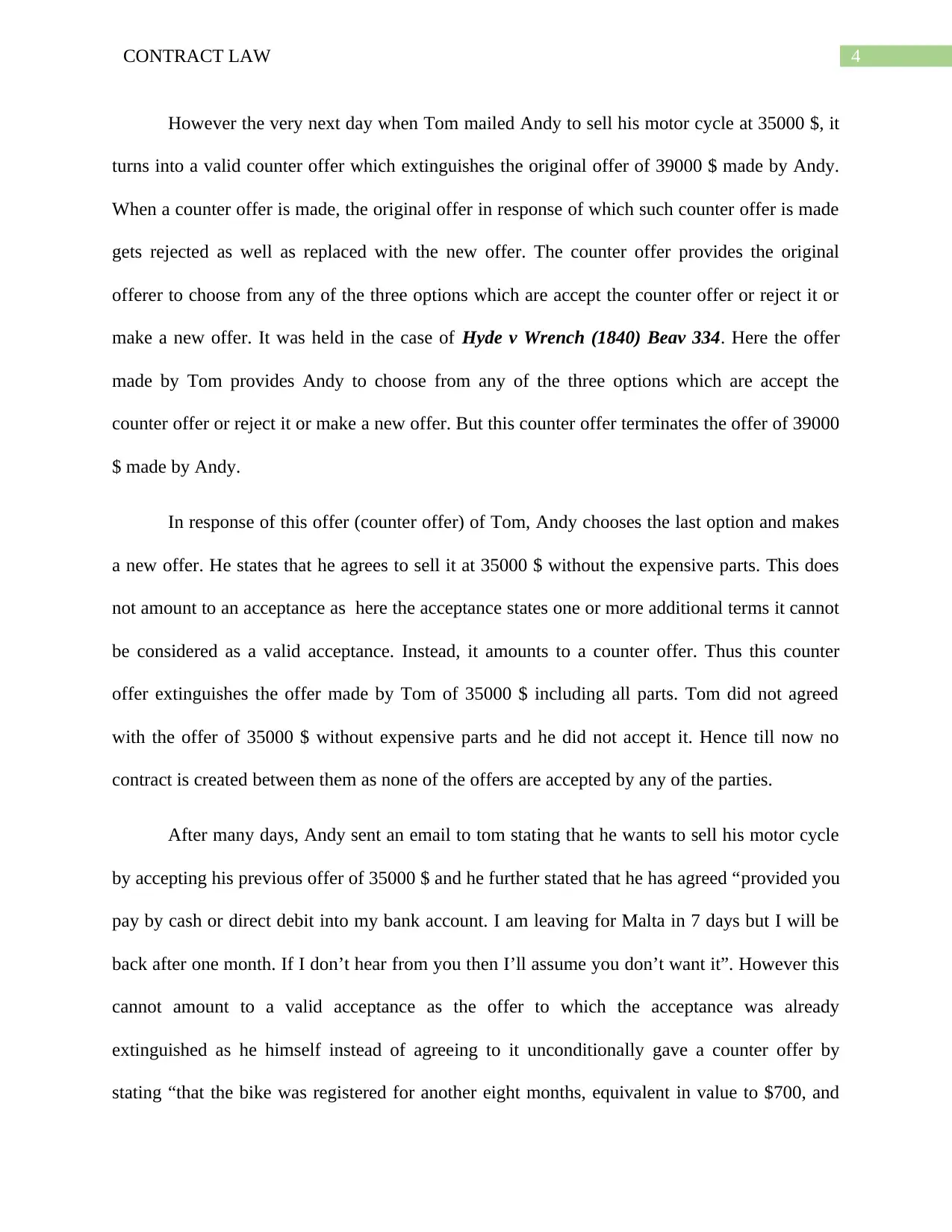
4CONTRACT LAW
However the very next day when Tom mailed Andy to sell his motor cycle at 35000 $, it
turns into a valid counter offer which extinguishes the original offer of 39000 $ made by Andy.
When a counter offer is made, the original offer in response of which such counter offer is made
gets rejected as well as replaced with the new offer. The counter offer provides the original
offerer to choose from any of the three options which are accept the counter offer or reject it or
make a new offer. It was held in the case of Hyde v Wrench (1840) Beav 334. Here the offer
made by Tom provides Andy to choose from any of the three options which are accept the
counter offer or reject it or make a new offer. But this counter offer terminates the offer of 39000
$ made by Andy.
In response of this offer (counter offer) of Tom, Andy chooses the last option and makes
a new offer. He states that he agrees to sell it at 35000 $ without the expensive parts. This does
not amount to an acceptance as here the acceptance states one or more additional terms it cannot
be considered as a valid acceptance. Instead, it amounts to a counter offer. Thus this counter
offer extinguishes the offer made by Tom of 35000 $ including all parts. Tom did not agreed
with the offer of 35000 $ without expensive parts and he did not accept it. Hence till now no
contract is created between them as none of the offers are accepted by any of the parties.
After many days, Andy sent an email to tom stating that he wants to sell his motor cycle
by accepting his previous offer of 35000 $ and he further stated that he has agreed “provided you
pay by cash or direct debit into my bank account. I am leaving for Malta in 7 days but I will be
back after one month. If I don’t hear from you then I’ll assume you don’t want it”. However this
cannot amount to a valid acceptance as the offer to which the acceptance was already
extinguished as he himself instead of agreeing to it unconditionally gave a counter offer by
stating “that the bike was registered for another eight months, equivalent in value to $700, and
However the very next day when Tom mailed Andy to sell his motor cycle at 35000 $, it
turns into a valid counter offer which extinguishes the original offer of 39000 $ made by Andy.
When a counter offer is made, the original offer in response of which such counter offer is made
gets rejected as well as replaced with the new offer. The counter offer provides the original
offerer to choose from any of the three options which are accept the counter offer or reject it or
make a new offer. It was held in the case of Hyde v Wrench (1840) Beav 334. Here the offer
made by Tom provides Andy to choose from any of the three options which are accept the
counter offer or reject it or make a new offer. But this counter offer terminates the offer of 39000
$ made by Andy.
In response of this offer (counter offer) of Tom, Andy chooses the last option and makes
a new offer. He states that he agrees to sell it at 35000 $ without the expensive parts. This does
not amount to an acceptance as here the acceptance states one or more additional terms it cannot
be considered as a valid acceptance. Instead, it amounts to a counter offer. Thus this counter
offer extinguishes the offer made by Tom of 35000 $ including all parts. Tom did not agreed
with the offer of 35000 $ without expensive parts and he did not accept it. Hence till now no
contract is created between them as none of the offers are accepted by any of the parties.
After many days, Andy sent an email to tom stating that he wants to sell his motor cycle
by accepting his previous offer of 35000 $ and he further stated that he has agreed “provided you
pay by cash or direct debit into my bank account. I am leaving for Malta in 7 days but I will be
back after one month. If I don’t hear from you then I’ll assume you don’t want it”. However this
cannot amount to a valid acceptance as the offer to which the acceptance was already
extinguished as he himself instead of agreeing to it unconditionally gave a counter offer by
stating “that the bike was registered for another eight months, equivalent in value to $700, and
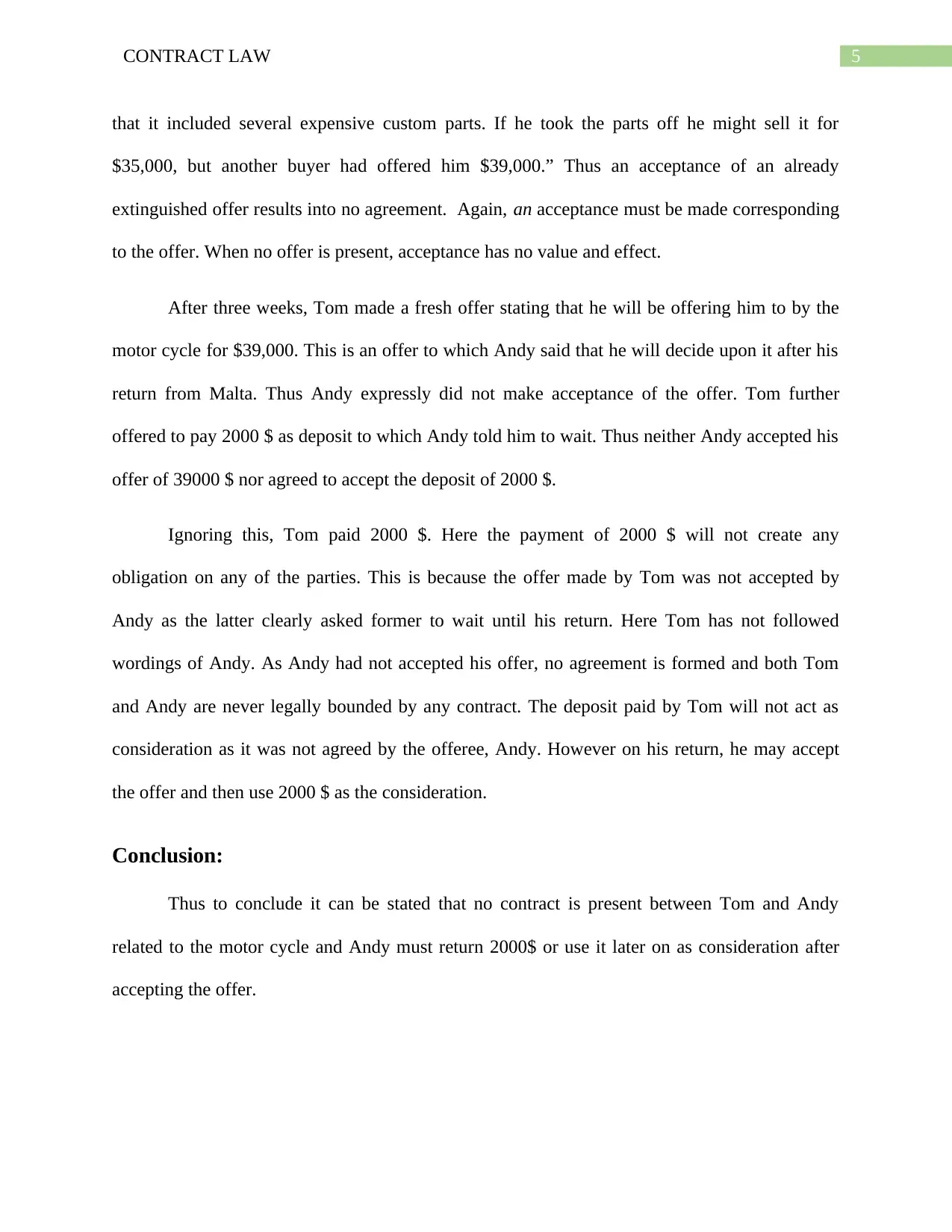
5CONTRACT LAW
that it included several expensive custom parts. If he took the parts off he might sell it for
$35,000, but another buyer had offered him $39,000.” Thus an acceptance of an already
extinguished offer results into no agreement. Again, an acceptance must be made corresponding
to the offer. When no offer is present, acceptance has no value and effect.
After three weeks, Tom made a fresh offer stating that he will be offering him to by the
motor cycle for $39,000. This is an offer to which Andy said that he will decide upon it after his
return from Malta. Thus Andy expressly did not make acceptance of the offer. Tom further
offered to pay 2000 $ as deposit to which Andy told him to wait. Thus neither Andy accepted his
offer of 39000 $ nor agreed to accept the deposit of 2000 $.
Ignoring this, Tom paid 2000 $. Here the payment of 2000 $ will not create any
obligation on any of the parties. This is because the offer made by Tom was not accepted by
Andy as the latter clearly asked former to wait until his return. Here Tom has not followed
wordings of Andy. As Andy had not accepted his offer, no agreement is formed and both Tom
and Andy are never legally bounded by any contract. The deposit paid by Tom will not act as
consideration as it was not agreed by the offeree, Andy. However on his return, he may accept
the offer and then use 2000 $ as the consideration.
Conclusion:
Thus to conclude it can be stated that no contract is present between Tom and Andy
related to the motor cycle and Andy must return 2000$ or use it later on as consideration after
accepting the offer.
that it included several expensive custom parts. If he took the parts off he might sell it for
$35,000, but another buyer had offered him $39,000.” Thus an acceptance of an already
extinguished offer results into no agreement. Again, an acceptance must be made corresponding
to the offer. When no offer is present, acceptance has no value and effect.
After three weeks, Tom made a fresh offer stating that he will be offering him to by the
motor cycle for $39,000. This is an offer to which Andy said that he will decide upon it after his
return from Malta. Thus Andy expressly did not make acceptance of the offer. Tom further
offered to pay 2000 $ as deposit to which Andy told him to wait. Thus neither Andy accepted his
offer of 39000 $ nor agreed to accept the deposit of 2000 $.
Ignoring this, Tom paid 2000 $. Here the payment of 2000 $ will not create any
obligation on any of the parties. This is because the offer made by Tom was not accepted by
Andy as the latter clearly asked former to wait until his return. Here Tom has not followed
wordings of Andy. As Andy had not accepted his offer, no agreement is formed and both Tom
and Andy are never legally bounded by any contract. The deposit paid by Tom will not act as
consideration as it was not agreed by the offeree, Andy. However on his return, he may accept
the offer and then use 2000 $ as the consideration.
Conclusion:
Thus to conclude it can be stated that no contract is present between Tom and Andy
related to the motor cycle and Andy must return 2000$ or use it later on as consideration after
accepting the offer.
⊘ This is a preview!⊘
Do you want full access?
Subscribe today to unlock all pages.

Trusted by 1+ million students worldwide
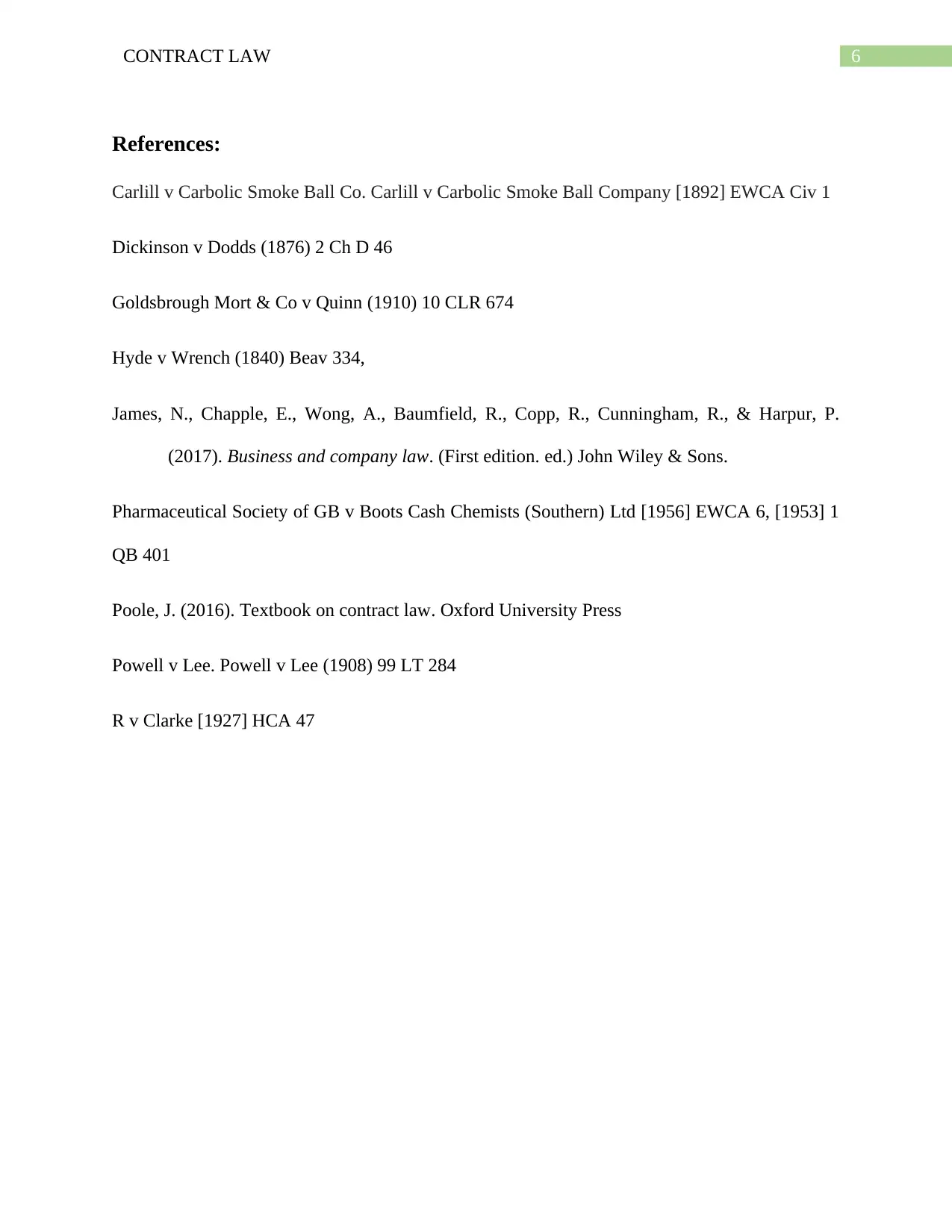
6CONTRACT LAW
References:
Carlill v Carbolic Smoke Ball Co. Carlill v Carbolic Smoke Ball Company [1892] EWCA Civ 1
Dickinson v Dodds (1876) 2 Ch D 46
Goldsbrough Mort & Co v Quinn (1910) 10 CLR 674
Hyde v Wrench (1840) Beav 334,
James, N., Chapple, E., Wong, A., Baumfield, R., Copp, R., Cunningham, R., & Harpur, P.
(2017). Business and company law. (First edition. ed.) John Wiley & Sons.
Pharmaceutical Society of GB v Boots Cash Chemists (Southern) Ltd [1956] EWCA 6, [1953] 1
QB 401
Poole, J. (2016). Textbook on contract law. Oxford University Press
Powell v Lee. Powell v Lee (1908) 99 LT 284
R v Clarke [1927] HCA 47
References:
Carlill v Carbolic Smoke Ball Co. Carlill v Carbolic Smoke Ball Company [1892] EWCA Civ 1
Dickinson v Dodds (1876) 2 Ch D 46
Goldsbrough Mort & Co v Quinn (1910) 10 CLR 674
Hyde v Wrench (1840) Beav 334,
James, N., Chapple, E., Wong, A., Baumfield, R., Copp, R., Cunningham, R., & Harpur, P.
(2017). Business and company law. (First edition. ed.) John Wiley & Sons.
Pharmaceutical Society of GB v Boots Cash Chemists (Southern) Ltd [1956] EWCA 6, [1953] 1
QB 401
Poole, J. (2016). Textbook on contract law. Oxford University Press
Powell v Lee. Powell v Lee (1908) 99 LT 284
R v Clarke [1927] HCA 47
1 out of 7
Related Documents
Your All-in-One AI-Powered Toolkit for Academic Success.
+13062052269
info@desklib.com
Available 24*7 on WhatsApp / Email
![[object Object]](/_next/static/media/star-bottom.7253800d.svg)
Unlock your academic potential
Copyright © 2020–2026 A2Z Services. All Rights Reserved. Developed and managed by ZUCOL.





